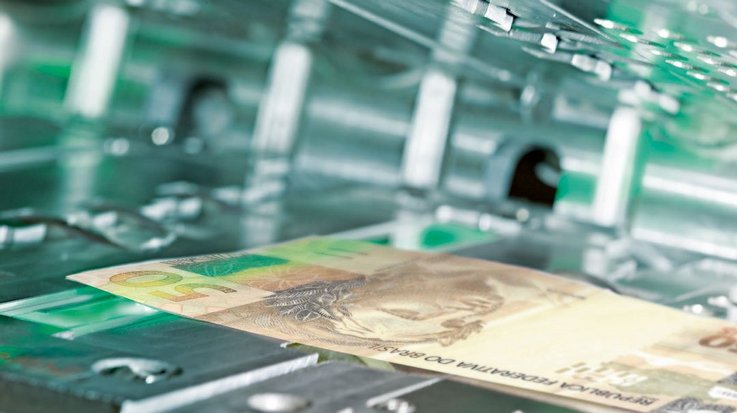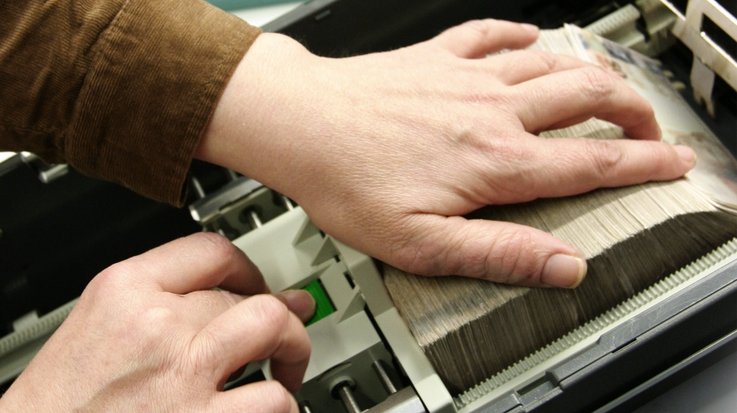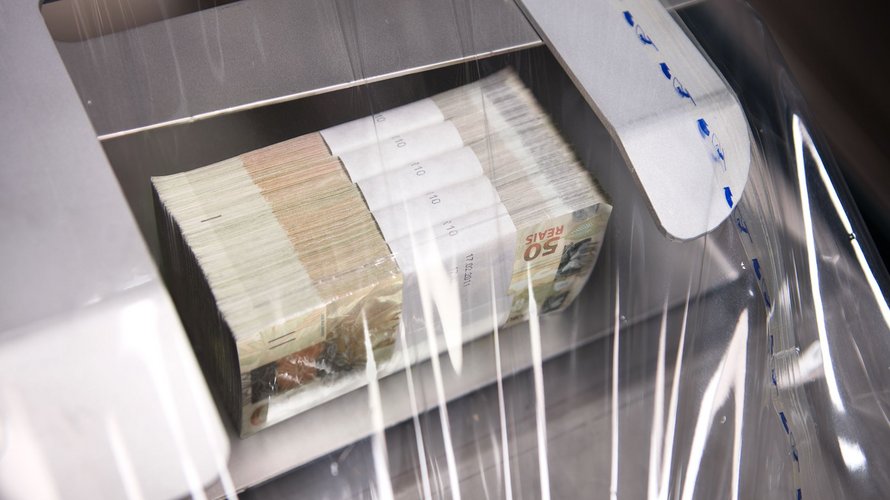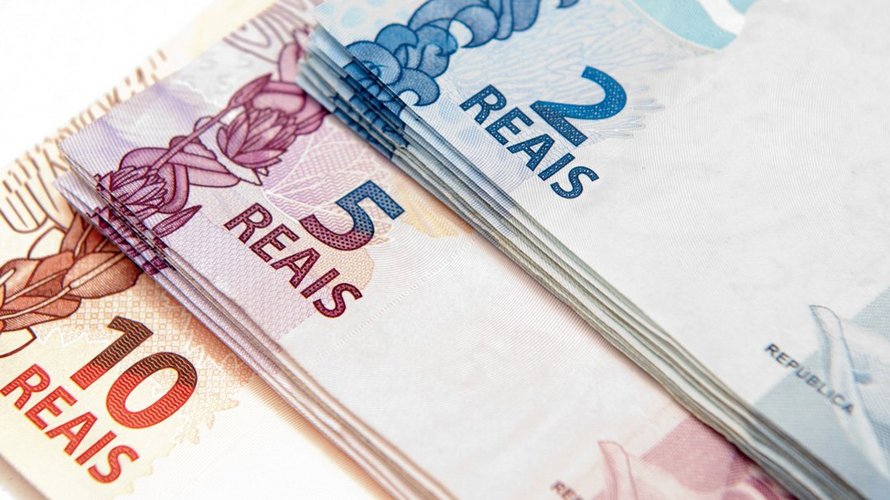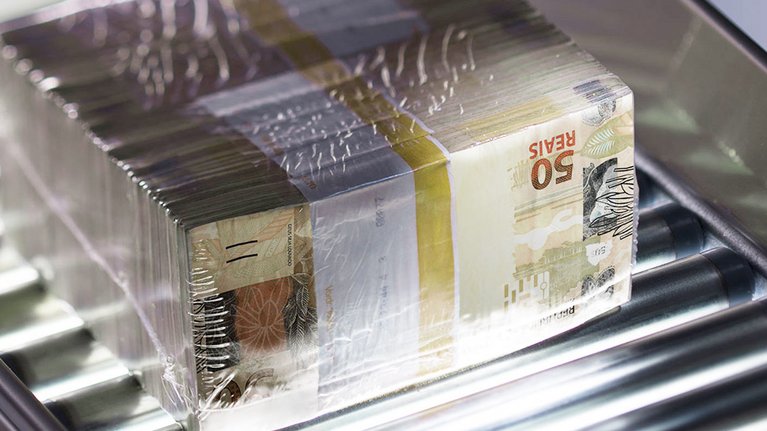
Cash processing – the cash bundle as a service.
Outsourcing is not limited to IT services; the mechanical processing of large quantities of cash is also very well suited to this process. It requires lower investment, fewer staff and less machine support from the central or commercial bank. The service is mostly calculated based on the quantity of cash processed – for example in the Central Bank of Brazil, where G+D operates cash processing.
Real notes come sealed in plastic bags (safe bags) and packed on pallets. Cash-in-transit companies supply the valuable freight directly to the ten nationwide cash centers operated by the Central Bank of Brazil, where G+D operates cash processing. The cash comes from their branches and from customers. Advanced systems check the quality of the notes, as well as sorting, verifying, and counting them. The full verified amount is compared with the amount stated by the depositor. If the cash register figure does not match, the values are credited to the respective accounts otherwise differences are reported. Cash that is still fit for circulation is returned to the money cycle, and unfit banknotes can be securely destroyed in the sorting machines.
Banks and cash are two concepts that are inextricably linked. However, processing vast quantities of cash poses increasingly significant challenges for central and commercial banks worldwide. “They need machines that can deal with different quantities and denominations of notes; they need staff who are able to operate, maintain and repair the systems; and they need experts who adjust these machines to perfectly suit the banknotes in circulation”, notes Reinhard Hofer, Global Program Manager Managed Services, at G+D Currency Technology. “None of this is the core business performed by central and commercial banks.” As a result, financial institutions are increasingly outsourcing this area. One of the most renowned outsourcing customers of G+D is the Central Bank of Brazil.
How outsourcing works and the benefits of managed services
Cash processing as a core competence
G+D is a Munich-based technology group that has, since the 1970s, been developing systems that automatically count and sort banknotes, and in particular verify their authenticity. The first central banks to pass the task of cash processing to third parties did so more than ten years ago. For this reason, G+D expanded its offering, providing all the support associated with advanced and efficient cash centers – from the processing room to full service. This includes, for example, hardware and software with all the necessary upgrades and updates; staff both to operate the machines and in some respects to work with them hand-in-hand; employees who maintain the machines and repair them when necessary; security solutions; and experts to update the software and provide data analysis.
„We operate the cash rooms in the centers for our customers, and take care of their day-to-day operational activities”, explains Reinhard Hofer, Head of Managed Services. “Due to cost advantages, greater flexibility and straightforward scalability, over recent years an increasing number of banks have selected us as an outsourcing partner for processing cash.” In addition to the Central Bank of Brazil, this also includes the largest commercial bank in the country, Banco do Brasil, which currently has 13 of its cash centers operated by G+D. Accounting is performed based on processed cash bundles, for example, with one bundle corresponding to 1,000 banknotes.
Cash processing is not part of banks’ core business.
Reinhard Hofer Global Program Manager Managed Services.
Cash volume development
The volume of cash is growing worldwide. The value of cash in circulation in the Eurozone has doubled within the past ten years. There are more than 100 billion banknotes in circulation in China, and the annual rate of increase exceeds ten percent. 500 billion banknotes are in circulation worldwide. However, as highlighted in a recent IMF Working Paper, cash plays a subordinate role in operational banking strategy. Banknotes are a customer service for banks, and are associated with logistical effort and expense. This makes it cost-efficient for some institutions to outsource cash processing.
Banks concentrate on their core business
Banks’ key benefits from outsourcing:
- Opex instead of Capex: financial institutes transfer long-term investment into operating expenses.
- Increasing efficiency: Process monitoring and optimization are core competencies of G+D.
- Reducing risks: G+D takes on cash processing operating activities, resulting in guaranteed performance at calculable costs for the bank.
Example: the Central Bank of Brazil
Service in use at the Central Bank of Brazil since 2009
The volume of cash in Brazil has been constantly increasing for many years: in April 2013, cash with a total value of 5.2 billion reais was in circulation, with this figure reaching 6.0 billion in April 2017 (source: Central Bank of Brazil). “The average annual rate of increase in cash volume is around five percent in Brazil”, reported Reinhard Hofer, Global Program Manager Managed Services, at G+D Currency Technology.
Processing real notes posed significant challenges for the central bank at the end of the 20th century. The increasing quantity of notes in circulation was almost impossible to manage within the existing structures. In many places, cash was only processed with small machines. The Central Bank of Brazil therefore made a decision in 1999 to increase the efficiency of their processes. Since 2009, it has been using managed services from G+D.
From cost center to profit center thanks to G+D.
Reinhard Hofer Global Program Manager Managed Services.
10 cash rooms and 80 employees distributed throughout Brazil
Reinhard Hofer explains that the Central Bank of Brazil would have had to invest in machines, hardware, and staff at the turn of the millennium to enable it to process the huge quantity of real notes. Instead of making investment of this type with long-term obligations, a decision was taken to pursue a calculable price model: outsourcing. The opportunity was put out to tender and G+D was awarded the contract. “Rather than a cost center, cash processing should become a profit center”, commented Hofer. Collaboration with G+D now comprises ten cash centers distributed throughout Brazil. Around 80 employees – “local experts” – operate all cash processing in the cash centers.
There are four types of machine in use at the Central Bank of Brazil, each with differing levels of automation and processing capacity. The BPS® M7 is the fastest model, processing more than 100,000 banknotes per hour. The workflows are highly automated: an employee inserts the real notes, and the BPS® M7 takes care of processing. The result at the end of the process is shrink-wrapped cash bundles. “The overall system configuration that is appropriate for a specific customer depends first and foremost on the quantity to be processed”, explains Hofer.
It is not possible to make general statements on the benefits of buying or leasing, as the respective business case considerations differ too greatly across the central and commercial banks. However, one thing is certain: cash processing as a service is certainly an interesting option for banks that wish to concentrate on their core competencies.
Related products
Get in touch
If you have any questions about our end-to-end business solutions or about our SecurityTech company, seek expert advice, or want to give us your feedback, our team is here to support you, anytime.






